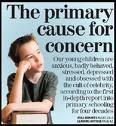An interesting question in the Guardian's 'Notes and Queries' last week: Has anyone who has been on Desert Island Discs ever not selected at least one piece of classical music? Respondents came up with Louis Armstrong and Philip Larkin, but I can well remember Greg Dyke coming up with the best and the most interesting set of choices I've heard so far -
1. Born to Run
Performer Bruce Springsteen
2. It Doesn’t Matter Anymore
Performer Buddy Holly
3. Strawberry Fields Forever
Performer The Beatles
4. Like a Rolling Stone
Performer Bob Dylan
5. Summertime
Performer Ella Fitzgerald & Louis Armstrong
6. Bat Out of Hell
Performer Meat Loaf
7. Great Balls of Fire
Performer Jerry Lee Lewis
8. Country House
Performer Blur
Record: Like a Rolling Stone
Book: Complete works of Dylan Thomas
Luxury: A guitar with a guide to playing it.
It's not a perfect list, and the only one of these tunes I'd have in my top 8 is Like A Rolling Stone, but it's by far the best list so far. Greg Dyke is terrific, and it was such a relief to have such an interesting set of good tracks instead of the usual muck.
It's interesting to consider the correlation between celebrities/castaways and a complete lack of taste when it comes to music. The majority of these people haven't got a clue. I sometimes wonder whether they ever pay any attention to music at all. Either that or there's a huge failure to offer people any sort of education in music in this country. Probably both.
Womad took up residence in the moat of the Tower of London this weekend – to very good effect. In an ideal world there would be a permanent stage and ongoing musical workshops on the site all year round.
Last week I finally got round to starting "Like A Rolling Stone" by Greil Marcus - a book that should be owned and read by everyone who's interested in music, in the history of blues, folk and rock, and of course interested in the Sixties, and especially Bob Dylan.
http://www.guardian.co.uk/music/2005/may/13/bobdylan
"July 24 1965 was the day Bob Dylan's Like a Rolling Stone went into the charts. It was on the radio across the US and heading straight up. When drummer Bobby Gregg brought his stick down for the opening noise of the six-minute single, the sound - a kind of announcement, then a void of silence, then a rising fanfare, then the song - fixed a moment when all those caught up in modern music found themselves engaged in a running battle for a prize no one bothered to name: the greatest record ever made, perhaps, or the greatest record that ever would be made.
That first drum shot is what seals it. "The first time I heard Bob Dylan," Bruce Springsteen said in 1989, inducting Dylan into the Rock'n'Roll Hall of Fame, "I was in the car with my mother listening to WMCA, and on came that snare shot that sounded like somebody had kicked open the door to your mind."
Rooney
The papers were full of digs at Rooney last week, again, because after being substituted he took off a boot and flung it down as he sat down in the dugout. It was a very minor display of petulance, and possibly just venting his frustration with the opposition's fans taunting him rather than with his manager, but of course he got slagged off in the press. Having praised him in a recent blog for his tremendously improved attitude and anger management I have to defend him and say – credit where it's due! The guy's trying hard, and playing better than ever. Leave him alone! It's the emotional and spiritual intelligence of the press that needs greater scrutiny.
The Rover Four
I don't think I've mentioned 4 guys who hit the headlines recently – the four bastards who bought MG/Rover for £10 and milked fucking millions from it before it crashed again. These were people who'd been lauded as the saviors of what remained of the British motor industry!
MG Rover: how the Phoenix Four hit the jackpot
Report into demise of car manufacturer reveals owners bought software to wipe clean hard drives and ran tax avoidance schemesThis has to be on record – how these arseholes went about making themselves rich at the expense of a workforce, and an entire community.
"Evidence Eliminator" computer software, a tax avoidance plot called "Project Slag", six-figure bribes and an office affair were just some of the more outlandish ingredients revealed today by the long-awaited investigation into the MG Rover scandal.
The 850-page report lays bare the breathtaking lengths to which its former owners, the so-called Phoenix Four, went to enrich themselves before the company – Britain's last large car manufacturer – collapsed in April 2005 with the loss of 6,500 jobs.
The four local businessmen and former MG Rover chief executive Kevin Howe paid themselves a total of £42m during their five-year ownership of the company, which they bought for a token £10 and left with more than £1bn in debts. The report concluded their financial rewards were "excessively large" despite the fact that the businessmen invested no money in the group after they bought it and took risks which were "relatively insubstantial".http://www.guardian.co.uk/business/2009/sep/11/mg-rover-phoenix-four
The inspectors also criticised how one or more members of the Phoenix Four made business decisions on an ad hoc basis, with no board meeting being held or minutes produced. They also criticised them for employing Dr Li, who received £1.6m in consultancy services over 15 months before MG Rover collapsed, even though one of the Phoenix Four – Nick Stephenson – had a "personal relationship" with her. Inspectors said that her fees were "excessive" and that apart from translation, she "didn't seem to add much".
But the Serious Fraud Office, which examined the report last month, decided that it did not reveal enough evidence to justify criminal proceedings against the Four. The only likely sanction they face is being disqualified as company directors.
Discussions on how the Phoenix Four businessmen could extract millions of pounds from MG Rover began the day before the deal to buy the car company from BMW for £10 was officially announced.Scumbags.
While John Towers was being given a hero's welcome on 9 May 2000 as he met workers in Longbridge, his financial advisers were already hatching a plan which would allow the four executives to take £75m out of the business.
The government report into the salvation and collapse of Britain's last volume carmaker highlights many occasions where the Phoenix Four appear to have put their own interests ahead of the MG Rover car company, which collapsed in April 2005.
http://www.guardian.co.uk/business/2009/sep/11/mg-rover-phoenix-four1
Right Wing Hate, Racism, Fox and Glen Beck
“Despite having accused President Obama of possessing "a deep-seated hatred of white people" and being "a racist" – which one might think would contravene Beck's much-vaunted "patriotism" – he remains employed by Fox News. Of course, seeing as the channel seems to have confused the words "news" and "propaganda", it's perhaps not that surprising that it might also mix up "talkshow" and "excuse for wackiness". That 50 advertisers have pulled out of his show has not dimmed Fox's love for its self-described "rodeo clown" because, as the channel pointed out, the advertisers have simply moved to different time slots, not other stations – so, as long as the hate speech doesn't cost them, meh.” - Hadley Freemanhttp://www.guardian.co.uk/commentisfree/2009/sep/16/hadley-freeman-glenn-beck
Jon Stewart in his Daily Show programme is also continuing to highlight the way in which the militant Right is becoming ever more hateful in its vilification of Obama – accusing him of being a socialist, a communist, un-American, a reverse racist, unpatriotic, etc.
Obama is pressing ahead with his proposals for health care reform, and now he's also announced his intention to scrap the installation of so-called anti-missile missiles in Poland. The man is admired and appreciated right around the world, and yet the level of hatred for him within his own country is incredible. These people are just indescribably vile, and crazed. They've had things their own way for so long under Bush and throughout the conservative ascendancy, and they can' t abide the fact that they now no longer hold the levers of power and completely rule the roost.
In yesterday's Observer Keith Richburg wrote a column on this subject.
http://www.guardian.co.uk/commentisfree/cifamerica/2009/sep/20/jimmy-carter-barack-obama-racism
“Jimmy Carter has always been one to speak bluntly – irritatingly so, to some of his critics. Even at 84, the former president continues to show his willingness to raise the most indelicate topics, often at the most inopportune time. This time, the topic is race and, more specifically, the racism that underlies some of the ugliest, most vociferous criticism of President Obama.
"I think people that are guilty of that kind of personal attack against Obama have been influenced to a major degree by the belief that he should not be president because he happens to be African-American," Carter said.
Obama-hatred among a certain segment of the extreme right has crossed a line into something else – it borders on the pathological.This fact is the really devastating one – 57% of whites who voted in the last election were too fucking dumb to understand that Obama is America's best hope for a decent future and for intelligent, enlightened leadership – an outstanding individual in every way. They were also so dumb they also didn't understand that McCain and the Lipstick Pig would have been a national disaster.
Republican and conservative leaders rushed to the microphones to condemn Jimmy Carter for playing the race card. Too bad that when it comes to condemning the racists – the ones carrying the signs and questioning the country of the president's birth – those same "leaders" have offered only a deafening silence.
Take a close look at the numbers. Obama won 53% of the vote overall, but he won just 43% of the white vote – McCain beat him by 12 percentage points among whites.
It's true that these fuckwits were, and are (see above), the victims of overwhelming and relentless right-wing propaganda over many years, but you can't help feeling that the majority of them were either the fatcat rich who support Republicanism for reasons of greed and ideology through thick and thin, or the kind of poor whites who really can't tell their arse from a hole in the ground.
In Our Time – Melvyn Bragg
Bragg's back!
St Thomas Aquinas
Melvyn Bragg discusses the life, works and enduring influence of the medieval philosopher and theologian St Thomas Aquinas with Martin Palmer, John Haldane and Annabel Brett.
St Thomas Aquinas' ideas remain at the heart of the official doctrine of the Roman Catholic Church today and inform philosophical debates on human rights, natural law and what constitutes a 'just war'.A radical form of Christianity - Dominicans and Franciscans - challenged the wealth of the church. They were vilified as a cult - denying themselves all the advantages of the established church. Their attitude was characterised as like a 'dumb ox', as they went about preaching to the poor.
Martin Palmer is Director of the International Consultancy on Religion, Education and Culture; John Haldane is Professor of Philosophy at the University of St Andrews; Annabel Brett is Lecturer in History at Gonville and Caius College, Cambridge.
In a sense this movement was an intellectual revolution. Albert the Great of Cologne engaged in a project to incorporate philosophy into Christianity. However, the secular clergy – the established officers of the church – were hostile to Aristotle, whose philosophy of nature believed in establishing secure scientific foundations for how the world works.
At that time there was considerable success on the part of 'the commentators' within the Arabic world in developing a workable model of science that could be taught at a university.
Autonomous enquiry into nature and 'natural being' was a challenge to the established church, which challenged over 200 Aristotelian propositions and their temporal framework. Aristotle had said we are dynamic agents seeking our own ends, which didn't sit well with people who believed we are all subject to “God's will”.
In the Platonic scheme the action happens in the intellectual sphere. Aristotle believed you have to look at what actually goes on in the word in order to understand it – the 'danger' here being that God drops out of the picture. Such thinking was also a threat to Islam.
Teleology (Greek: telos: end, purpose) is the philosophical study of design and purpose. A teleological school of thought is one that holds all things to be designed for or directed toward a final result, that there is an inherent purpose or final cause for all that exists. - Wikipedia http://en.wikipedia.org/wiki/TeleologyThis belief says the world is a system of interacting substances, but ultimately things are not self-explanatory. St T used the archer and target analogy – with God seen as the archer or conductor.
He argues that by observing the world we can draw conclusions that still lead us towards God - we have to conclude that before things are able to move there is that which moves them, which itself is immovable and initiates movement.
But what happened before anything happens, and therefore what is God?
St T was more interested in establishing the idea of the 'first cause' than in describing God – linking the material and the spiritual. Yet he continued to believe in Revelation - something beyond reason.
St T did not think there's an innate desire for God, as such - only for 'our highest good'. So what is our highest good? We need to discover out our highest principles.
St T said we participate in God's reason - it is of our essence to share in God's governance of us, and exercise self-direction towards the good. This rational being needs to live in a society that is governed by reason and adherence to God's will.
[Check out Blair and Bush here . . . and their supporters in the fundamentalist Christian movement - an eye for an eye etc.]
There was a delicate balance between the sphere of human reason and the sphere in which rulers should take their direction from the Pope, who spoke as God's messenger.
St T raised the question - what if you personally think the king, the ruler or the emperor was wrong? He was condemned for this. However, he ended up in theologically orthodox positions - though at the time he seemed like a revolutionary. Some of us can identify with this.
Post-Reformation the Council of Trent turned to St T for an idea of synthesis. Political heads may have to lead through the power of reason, but their political philosophy must be formed by God and adherence to His will. Amazing.
Eventually St T says ' there are no more words'. 'After all my writing, I am speechless.'
Which is pretty much in line with Zen! Words can only do so much, and there are spiritual realities and truths that are beyond words.
"Reality is something of which we have only a dim sense." "Our completion is something that words cannot begin to describe." And of course it's the pursuit of the nature of reality that Zen sets out to address – chiefly through use of the senses combined with silent meditation and the use of intuitive, not logical, intelligence – i.e. spiritual intelligence, and not use of the 'intellect'.
So my own interpretation is that St T was in favour of intellectual flourishing, but also metaphysical engagement and understanding. Not that a programme devoted to science and to the intellect would use a word like metaphysical!
http://en.wikipedia.org/wiki/Thomas_Aquinas
http://www.bbc.co.uk/iplayer/episode/b00mkd63/In_Our_Time_St_Thomas_Aquinas/
.

















.JPG)








